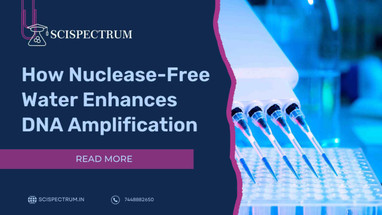Posted by Scispectrum on 22nd Aug 2025
The Unsung Hero of DNA Amplification: Why Nuclease-Free Water Matters
In the world of molecular biology The Unsung Hero of DNA Amplification, DNA amplification techniques like Polymerase Chain Reaction (PCR) reign supreme. This revolutionary technology allows scientists to replicate tiny amounts of DNA into millions of copies, opening doors for groundbreaking research in genetics, diagnostics, and beyond. But behind every successful PCR experiment lies a critical, often overlooked component: nuclease-free water.
This article delves into the crucial role of nuclease-free water in DNA amplification, exploring its significance, benefits, and best practices for ensuring optimal results in your molecular biology workflows.
Understanding the Foe: Nucleases and DNA Degradation
Before we dive into the solution, let’s understand the problem. Nucleases, as their name suggests, are enzymes that break down nucleic acids like DNA and RNA. These enzymes are ubiquitous in the environment, found everywhere from the air we breathe to the surfaces we touch.
In a PCR reaction, the presence of even trace amounts of nucleases can spell disaster. These molecular scissors can chop up your precious DNA template or the amplified product, leading to:
- Reduced Sensitivity: Degraded DNA templates result in fewer starting molecules for amplification, leading to weaker signals and potentially false-negative results.
- Inaccurate Amplification: Nucleases can introduce random breaks in the DNA, leading to non-specific amplification or truncated products, compromising the accuracy of your results.
- Reaction Failure: In extreme cases, high nuclease activity can completely degrade the DNA, leading to complete reaction failure and wasted time, resources, and precious samples.
Nuclease-Free Water: The Guardian of DNA Integrity
Nuclease-free water, as the name implies, is purified water that’s been specifically treated to remove or inactivate nucleases. This ensures that the water used in your PCR reactions doesn’t contribute to DNA degradation, safeguarding the integrity of your experiments.
How is Nuclease-Free Water Produced?
Producing nuclease-free water involves a multi-step purification process that typically includes:
- Filtration: Water is passed through progressively finer filters, removing particulate matter, microorganisms, and larger molecules, including some nucleases.
- Deionization: Ion exchange resins remove charged ions, further purifying the water and reducing the likelihood of nuclease activity.
- Ultraviolet (UV) Irradiation: Exposure to UV light effectively disrupts the structure of nucleic acids, including any residual nucleases, rendering them inactive.
- Filtration (0.2 µm or smaller): A final filtration step using ultra-fine filters removes any remaining particulate matter and ensures the water is free from microorganisms.
The Benefits of Using Nuclease-Free Water
The use of nuclease-free water in DNA amplification reactions offers numerous advantages:
- Enhanced Sensitivity and Accuracy: By preventing DNA degradation, nuclease-free water ensures that you’re amplifying the intended target, leading to more reliable and accurate results.
- Improved Reproducibility: Consistent use of high-quality, nuclease-free water minimizes variability between experiments, leading to more reproducible results.
- Increased Efficiency: With less DNA degradation, you’ll achieve higher amplification yields, maximizing the efficiency of your reactions.
- Protection of Valuable Samples and Reagents: Nuclease-free water safeguards your precious DNA samples and expensive reagents from degradation, saving you time and resources.
Best Practices for Using Nuclease-Free Water
To maximize the benefits of nuclease-free water, consider these best practices:
- Source from Reputable Suppliers: Purchase nuclease-free water from trusted suppliers who provide certified and validated products.
- Store Properly: Store nuclease-free water in tightly sealed containers to prevent contamination. Avoid storing in frost-free freezers, as temperature fluctuations can compromise its integrity.
- Use Fresh Aliquots: To minimize the risk of contamination, aliquot nuclease-free water into smaller volumes and avoid repeated freeze-thaw cycles.
- Handle with Care: Always wear gloves when handling nuclease-free water and use sterile techniques to prevent contamination from your hands or equipment.
Conclusion: A Small Investment, a Big Impact
While often overlooked, nuclease-free water is an essential component of successful DNA amplification. By investing in high-quality, nuclease-free water and following best practices for its use and storage, you can ensure the accuracy, reliability, and efficiency of your molecular biology experiments, paving the way for groundbreaking discoveries.

